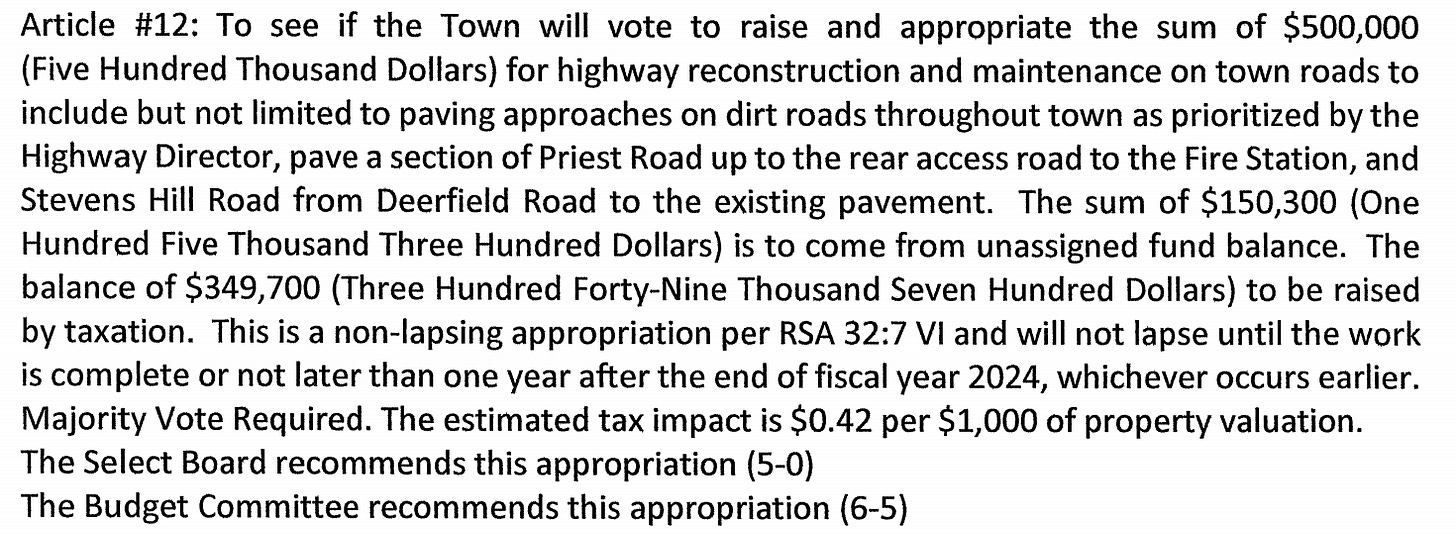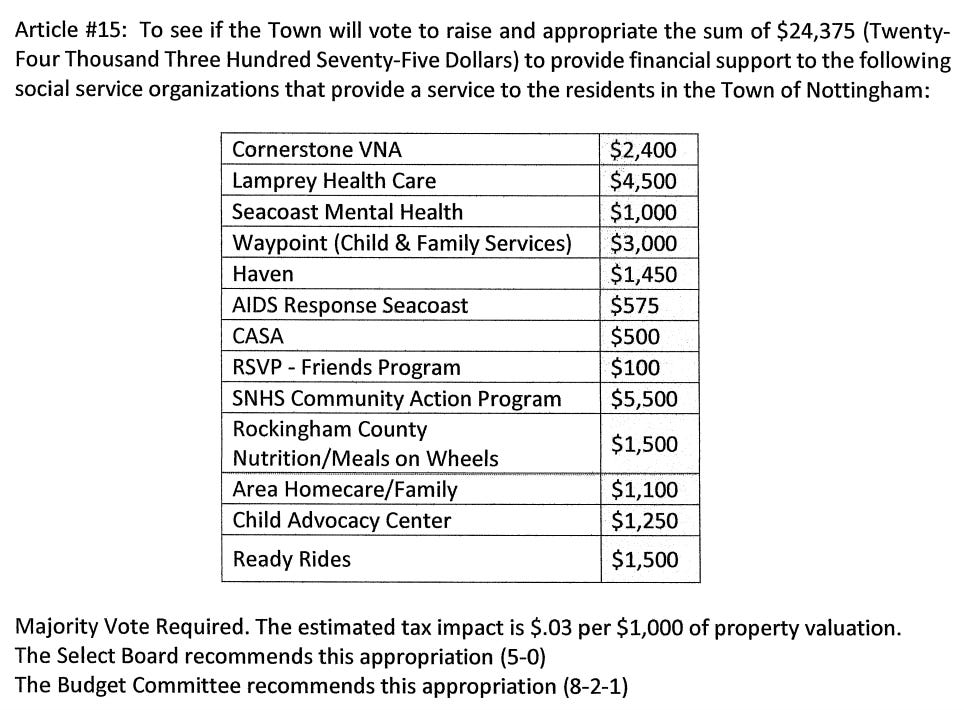What to Expect at Deliberative Session February 3, 2024
Nottingham School at 9:00 am Saturday. Be there to have your voice heard and your vote count.
Several motions to change the town’s operating budget and warrant articles can be expected at Saturday’s Deliberative Session. Mostly the issues will be about what to spend money on and how much to spend, but other issues may come up.
Some useful advice from the NH Municipal Association about what the voters can do during the deliberative session:
Some people believe that voters can only act on, or amend, the bottom line of the budget, and not specific line items. That’s not quite right. What is right is that the voters cannot limit the governing board’s ability to transfer amounts from one line item to another during the year, as needs and priorities change…. Therefore, even if you do vote to lower, say, the police budget by $1,000, the selectmen, later in the year, can still replace that $1,000 into the police budget, as long as they don’t exceed the bottom line of the entire budget.
Hint: Transfers cannot be made from appropriations made by separate warrant articles (RSA 31:10, IV). Therefore, the way to prevent an appropriation from being diverted to other purposes is to submit a petitioned warrant article for that appropriation.
But just because only the bottom line is legally binding, doesn’t mean the voters can’t amend line items. The voters have a legal and political right to express their preferences. A vote on specific line items sends a strong message that may later be “enforceable” through the ballot box, even if it’s not enforceable in court.
[In towns such as Nottingham that have a Budget Committee] the voters are legally bound by the so-called “Ten Percent Rule.” Under this rule, the voters cannot appropriate more money at any single town meeting than the total amount recommended for that meeting by the Budget Committee, plus ten percent.
Also, if the meeting votes to delete an appropriation within a warrant article or budget, or reduces the amount to zero, or does not approve an appropriation contained in a separate article, no amount of money may be spent for that purpose (RSA 32:10, I(e)). This is often referred to as the “no means no” rule.
There’s no such thing as an “illegal vote.” …It’s true that there are plenty of types of town votes which, if they pass, will not be legally binding (i.e. would not be enforceable in court). But that doesn’t mean the town can’t vote on those things anyway. No group of voters has ever been arrested for taking a vote, no matter how off-the-wall it might be. …don’t be misled into thinking that non-binding votes are somehow “illegal.”
It’s OK to ask questions. The beauty of the traditional “deliberative” session of town meetings … is that through the process of discussion and debate, the voters can educate themselves about the question at hand, and about the procedure, and become able to vote more intelligently. Don’t shyly assume that everybody but you knows what’s going on. They probably don’t.
Another thing that is useful to consider is that these meetings can take a lot of your and your neighbors’ time. As the saying goes, time is money. If 400 people are there and the average value of their time is, say, $25 per hour, that’s $10,000 per hour or $167 per minute. It’s good to consider this if you choose to speak. Not only should you keep it brief and to the point, it’s not worth having long debates over small budget appropriations.
Operating Budget
Here’s the operating budget proposed to the voters by the Budget Committee. In creating this budget the Budget Committee and the Board of Selectmen were constrained by the 4% tax cap. At the deliberative session, the voters can make adjustments to the budget, increasing it as much as 10% over what the Budget Committee has proposed.
The budget was approved by a bare 6-5 majority of the Budget Committee, indicating that several members of the committee are unhappy with it and will likely move to make changes at the deliberative session. A motion to reduce the total budget is anticipated as are motions to change specific line items. Two motions that can be anticipated are one to restore funding to the Community Newsletter and one to change the budget for legal fees.
Warrant Articles
Here are the warrant articles proposed to the voters. At the deliberative session, the voters may make changes to those warrant articles. They can amend the language and change the amounts to be appropriated. Commonly, opponents of a warrant article involving spending will propose changing the amount to $0 so that even if approved at the ballot box the article will have no effect.
While voters at deliberative season may not change the subject of a warrant article, they are free to edit the language of the warrant article such that it has a different intent or effect. A recent example of this occurred during the 2021 deliberative session with an attempt to change the language of warrant article #19 about the camp roads, which the voters rejected.
By town rules, any motion to change the wording of a warrant article must be accompanied by a written text of the proposed wording. So, if you’re planning on proposing rewording, print out that rewording in advance. It’s also useful to come prepared to write down new wording during the meeting in case you get involved in a debate about what the wording should be.
Warrant articles likely to be controversial are those not unanimously endorsed by the Budget Committee and the Board of Selectmen. Here are the articles I think are likely to be debated.
Article #6 - Fire Chief Compensation
This warrant article is highly controversial, with a clear majority of the Budget Committee opposed to it. The controversy is not just about the cost to the taxpayers. It extends to how the Fire Chief should be chosen, how the Fire Department is being run, and the myriad issues associated with the Board of Selectmen’s management of the process that led up to the decision to fire the Town’s long-term Fire Chief.
It can be anticipated that there will be a motion to reduce the figure in this article to $0. Not only does this warrant article increase the Fire Chief’s direct compensation from $11,440 to $71,440, not mentioned in this warrant article is the fact that this change will make the position eligible for benefits, further increasing the costs to the taxpayers.
Opponents of the article may also attempt to change the language of the article to direct the Nottingham Fire Rescue Department to change their bylaws to conform to the method of selecting the Fire Chief as established by prior warrant article. The article says it is due to changes to the Fire Department’s bylaws. These changes are of questionable legality, as they arguably conflict with the method of selecting a Fire Chief that the town established into law by warrant article. There may be objections to the language of the article because it asks the voters to conform to the wishes of the department rather than directing the department to conform its bylaws to the wishes of the voters.
Proponents of this warrant article have so far made little outreach to the public to explain the advantages of the article. I anticipate substantial, possibly even acrimonious debate about the article.
Article #9: Community Center Rehabilitation
The likely objection is that this is something we should not spend money on and that there will be a motion to reduce the appropriation to $0.
Article #10: Library Parking Lot
There’s a long-standing debate in the town between the supporters of the town library and those who are opposed to spending money on the library. Usually, the library supporters win these votes, but it’s all dependent on who gets their supporters to show up to vote.
Article #12: Highway Reconstruction
One controversial move made by the Board of Selectmen was to tap the town’s unassigned fund balance to partially fund this warrant article. This fund is made up of taxes that were collected in prior years but were not spent. Because it is illegal for a town to spend more than what was budgeted, there’s always some money left unspent at the end of the year as it is needed as a buffer.
Concerns have been expressed about whether it makes sense to pave the section of Priest Road up to the rear access road to the Fire Station as warrant article #8 proposes that a plan should be created for a new Police Station. It has been proposed that the new Police Station could be located next to the Fire Station facing Priest Road.
The idea of paving a short section of dirt roads where they abut paved roads is to reduce the chronic potholing that is created by vehicles accelerating from the dirt road onto the paved road, and to eliminate the need to grade these sections as it is time-consuming and can block traffic on the paved roads.
This is an expensive warrant article. As so many Budget Committee members voted against recommending this warrant article, debate can be anticipated about how needed this road work is and whether this money should be appropriated. I anticipate there will be one or more motions to change the warrant article.
Article #15: Social Services
The Town has a long history of providing financial support to several local non-profit organizations that provide services to Nottingham residents in need. For example, Lamprey Healthcare provides medical services to Nottingham residents who lack health insurance. [Disclosure: my wife works for Lamprey Healthcare.] In recent years this financial support has been part of the operating budget, but in past years this was routinely put to the voters as a warrant article.
Articles #16 & #17: Invasive Species
The appropriations for combating invasive species are a recurrent topic for debate at deliberative sessions. Those for and against these expenditures work to bring out their supporters. On election day there’s typically strong support for this spending. Here’s the outcome of last year’s vote:
Hence, opponents of this spending aim to change this figure at the deliberative session to prevent it from being funded at the ballot box. Correspondingly, proponents engage in a get-out-the-vote effort for deliberative sessions. For example, the Pawtuckaway Lake Improvement Association recently mailed its members urging them to attend the deliberative session to prevent “any attempt to gut these Warrant Articles.”
Article #18: New Voting-Counting Machine
Certification for the town’s existing vote-counting machine is expected to lapse at the end of 2024. By law, the town is supposed to machine-count votes, so a new machine is needed for next year. However, five Budget Committee members voted against this appropriation, indicating it is likely to be a point of contention at the deliberative session.
Article #22: Other Business
While to be legally binding an action must take place by warrant article, the deliberative session is the one chance per year for the voters to gather to talk about, ask questions, and take votes on anything about town government they wish. As the past year has been full of controversies, anything could come up during this part of the meeting, from issues as big as how the complaints against the Fire Chief were handled and whether certain selectmen have adhered to the board’s code of ethics, to as small as the town refusing to compensate a resident for having their mailbox destroyed by a town snowplow or their well poisoned by road salt.













